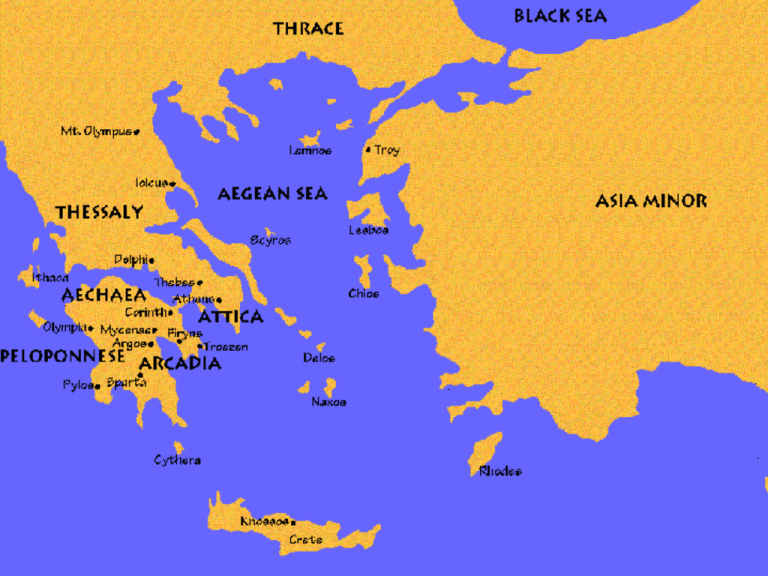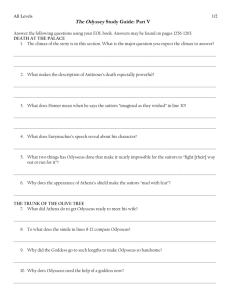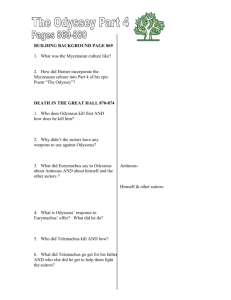Odyssey: Themes, Characters & Structure - Lecture Notes
advertisement

Odyssey Andra moi ennepe Mousa polutropon, hos mala polla 1.1 Of the man tell me, Muse, the man of many turns, who traveled afar after he had sacked the holy city of Troy. He experienced the cities and the thoughts of many men, and his spirit suffered many sorrows on the seas as he laboured for his own life and for the homecoming of his companions. But not by will or by valour could he save them, for their own recklessness (atasthalia) destroyed them all. Xenia - guest-friendship 1.120 (140-1) “vexed that a guest should stand at the door so long” (261) [226] Is it a drinking bout, or a wedding feast? For this plainly is no meal to which each brings his portion, with such outrage and overweening do they seem to me to be feasting in thy halls. Angered would a man be at seeing all these shameful acts, any man of sense who should come among them. aoidos - bard Phemius (190) (175) Their hearts turned to other things, to song and to dance; for these things are the crown of a feast. And a herald put the beautiful lyre in the hands of Phemius, who sang perforce among the wooers; [155] and he struck the chords in prelude to his sweet lay. Achilles and Odysseus (78) [65] How should I, then, forget godlike Odysseus, who is beyond all mortals in wisdom, and beyond all has paid sacrifice to the immortal gods, who hold broad heaven? • • • • • • • • • raging obdurate death in battle denial of life skilled in war aretê Poseidon’s opposition? best of the Achaeans Thetis • • • • • • • • • patient compromising last to return home rejection of immortality skilled in peace intelligence noos Poseidon’s opposition most unhappy of mortal men Athena Morality Iliad and Odyssey • • • • fate timê geras kleos • • • • theodicy 1.12 recklessness (atasthalia) Aegisthus polymetis (37) Look you now, how ready mortals are to blame the gods. It is from us, they say, that evils come, but they themselves, through their own recklessness (atasthalia), have sorrows beyond that which is ordained. [35] Even as now Aegisthus, beyond that which was ordained, took to himself the wedded wife of the son of Atreus, and slew him on his return, though well he knew of sheer destruction, seeing that we spoke to him before, Structure of Epic’s Books • • • • • • • • 1 assembly of gods; Athena to Ithaca 2-4 Telemachus goes to Pylos and Sparta 5-8 Odysseus leaves Calypso for Phaeacia 9-13 Odysseus narrates adventures from Troy to Calypso 13-14 Odysseus arrives in Ithaca 15-16 Telemachus completes his travels 17-19 Odysseus scouts his home in disguise 20-23 contests with the suitors • 24 conclusion Aristotle’s summary : A man is away from home for many years; he is watched closely by Poseidon; further, things at home are such that his property is being wasted by suitors and his son is being plotted against. He arrives storm-tossed; he causes certain recognitions. Attacking, he survives, and destroys his enemies. This is proper to the Odyssey; the rest is episodes. Poetics 1455b17-23 Folktale - the revenant hero the homecoming husband: ‘husband arrives home just as wife is to marry another’. The hero leaves home after marriage and after setting a period for his wife to wait, after which she may remarry. He is imprisoned or tarries in a strange land. Sometimes the hero goes to the underworld. The wife is forced to remarry. He returns and presents himself in disguise. He is identified by tokens and recognized. The new marriage is cancelled. Penelope 1. (376) From her upper chamber the daughter of Icarius, wise Penelope, heard his wondrous song, [330] and she went down the high stairway from her chamber, not alone, for two handmaids attended her. Book 2. (94) It is not the Achaean suitors who are responsible, but your own mother, for she is crafty above all women. For it is now the third year and the fourth will soon pass, [90] since she has been deceiving the hearts of the Achaeans in their breasts. To all she offers hopes, and has promises for each man, sending them messages, but her mind is set on other things. Book 5. (237) Mighty goddess, don’t be angry with me for this. I know full well of myself that wise Penelope is meaner to look upon than you in beauty and in stature, for she is a mortal, while you are immortal and ageless. But even so I wish and long day by day [220] to reach my home, and to see the day of my return. Book 6 Nausicaa (148) Even so Odysseus was about to enter the company of the fair-tressed maidens, naked though he was, for need had come upon him. But terrible did he seem to them, all befouled with brine, and they shrank in fear, one here, one there, along the jutting sandspits. Alone the daughter of Alcinous kept her place, for [140] in her heart Athena put courage, and took fear from her limbs. She fled not, but stood and faced him; and Odysseus pondered whether he should clasp the knees of the fair-faced maid, and make his prayer, or whether, standing apart as he was, he should beseech her with gentle words, in hope that she might show him the city and give him raiment. (163) “I beseech thee, O lady, — you are a goddess, or are you mortal? [150] If you are a goddess, one of those who hold broad heaven, to Artemis, the daughter of great Zeus, do I liken you most nearly in comeliness and in stature and in form. But if you are one of mortals who dwell upon the earth, thrice-blessed then are your father and honored mother, [155] and thrice-blessed your brethren. (220) That mortal man lives not, or exists nor shall ever be born who shall come to the land of the Phaeacians as a foeman, for we are very dear to the immortals. Far off we dwell in the surging sea, [205] the furthermost of men, and no other mortals have dealings with us. (296) [270] For the Phaeacians care not for bow or quiver, but for masts and oars of ships, and for the shapely ships, rejoicing in which they cross over the grey sea. (338) There, too, leaning against the selfsame pillar, is set the throne of my father, whereon he sits and drinks his wine, like an immortal. [310] Pass him by, and cast your hands about my mother's knees, so that you may quickly see with rejoicing the day of your return, though you have come from never so far. If in her sight you win favour, then there is hope that you will see your friends, and return [315] to your well-built house and unto your native land.”





